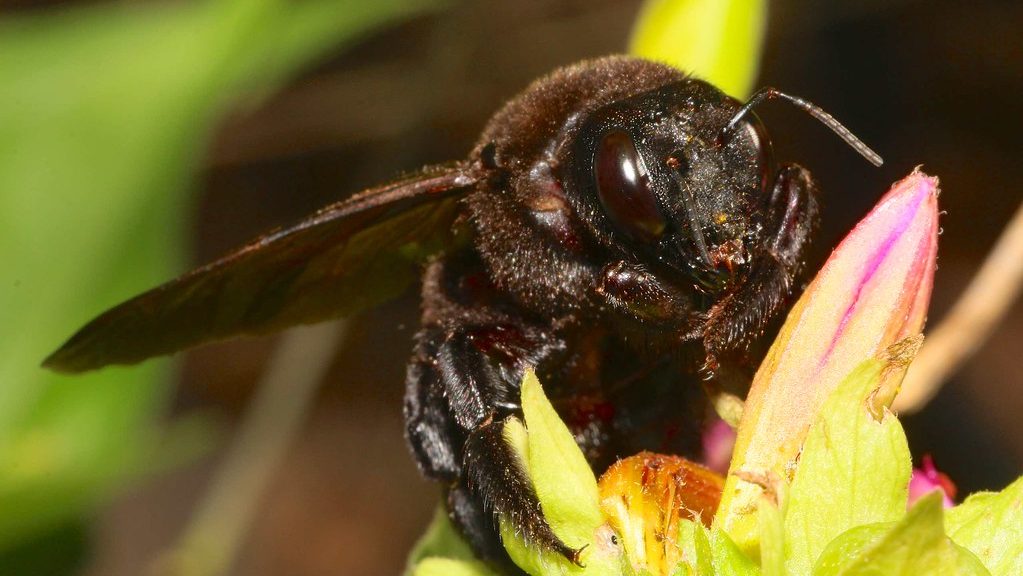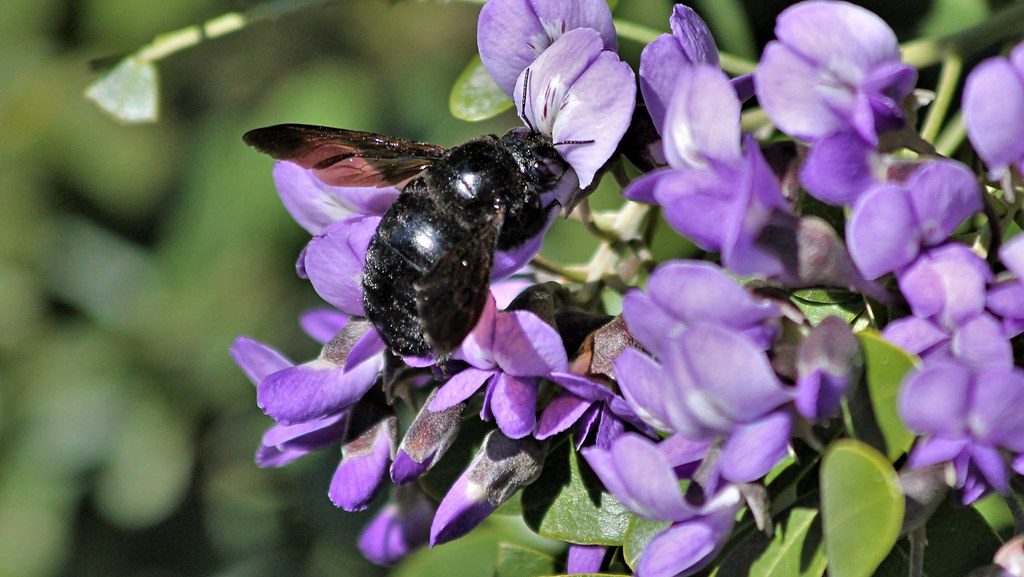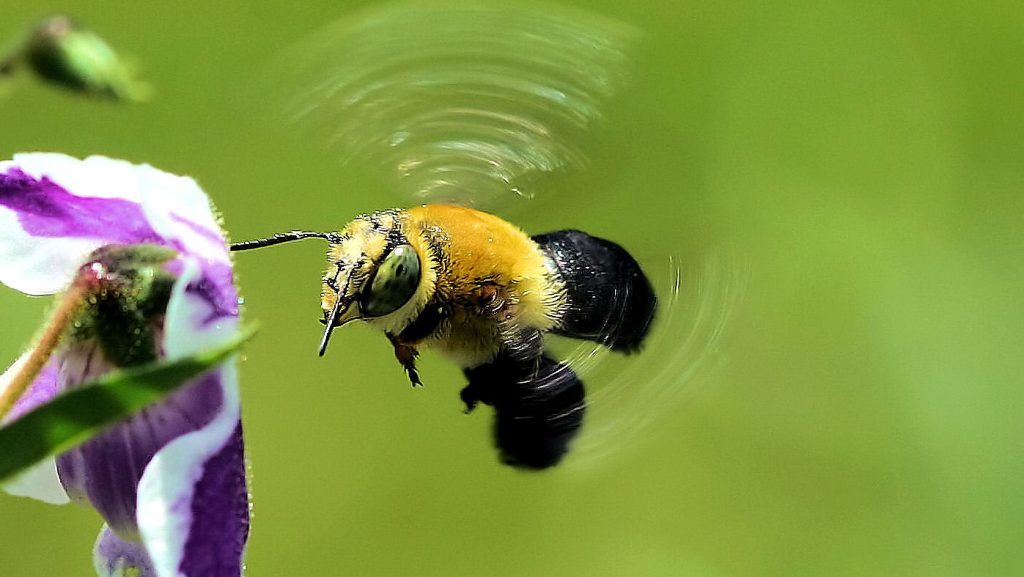Carpenter bees may look like bumblebees, but their behavior and potential impact on your property can differ vastly. Known for their habit of boring into wood, they have sparked curiosity and concern over whether carpenter bees are destructive.
Let’s explore how carpenter bees operate, their effects on your home, how bad is a carpenter bee sting, what do carpenter bee holes look like, and the steps you can take to prevent carpenter bee infestations.




 If you feel things have gone out of control, it is advised to contact pest control professionals. Our team can provide a customized approach to protect your home effectively.
Prevention techniques might not be enough if you’re already dealing with a carpenter bee infestation in your home. Our pest control professionals provide a customized solution to protect your home effectively. Get a free estimate today!
If you feel things have gone out of control, it is advised to contact pest control professionals. Our team can provide a customized approach to protect your home effectively.
Prevention techniques might not be enough if you’re already dealing with a carpenter bee infestation in your home. Our pest control professionals provide a customized solution to protect your home effectively. Get a free estimate today!

Are Carpenter Bees Destructive?
Carpenter bees can be destructive, though the extent of the damage depends on the infestation’s severity and location. Unlike termites, they do not eat wood but bore perfectly round holes to create tunnels for nesting. Signs of Carpenter Bee Damage:- Wood Boring: Carpenter bees prefer untreated, softwood surfaces such as decks, fences, and eaves. Over time, the tunnels can weaken structural integrity.
- Secondary Damage: Woodpeckers may target infested areas to feed on carpenter bee larvae, causing further destruction.
- Cosmetic Issues: Visible holes and yellowish stains from bee excrement can detract from your home’s appearance.
What Do Carpenter Bee Holes Look Like?
Carpenter bee holes are one of the most distinctive signs of their presence. These entry points are easy to identify due to their precision and location.Characteristics of Carpenter Bee Holes
-
 Perfectly Round Shape: The holes are about 1/2 inch in diameter, resembling a drilled opening.
Perfectly Round Shape: The holes are about 1/2 inch in diameter, resembling a drilled opening. -
 Sawdust (Frass): Small piles of sawdust beneath the hole indicate active boring.
Sawdust (Frass): Small piles of sawdust beneath the hole indicate active boring. -
 Preferred Locations: Common nesting spots include exposed wooden surfaces, fascia boards, and wooden furniture.
Preferred Locations: Common nesting spots include exposed wooden surfaces, fascia boards, and wooden furniture.


Not getting a solution?
Get your free pest control estimate today!How Carpenter Bees Cause Damage
The damage carpenter bees cause is primarily structural. Their tunneling leaves behind holes and a network of channels inside the wood. Over time, this can affect the integrity of wooden structures, especially if the bees are left to nest repeatedly. If left unchecked, homeowners might notice sawdust accumulating beneath the entrance holes or hear faint buzzing sounds from within the wood. Though carpenter bees are not as destructive as termites, their behavior can lead to long-term issues, particularly in untreated wood. Even though they tend to avoid painted or varnished wood, they may still pose a risk to wooden structures that lack proper maintenance.How Bad Is a Carpenter Bee Sting?
One of the common concerns about carpenter bees is their sting. While these insects are generally docile, understanding their behavior is crucial. Male Carpenter Bees: Males cannot sting but may act aggressively by hovering near people to defend their territory. Female Carpenter Bees: Females can sting but rarely do so unless directly threatened.The sting is comparable to that of a honeybee, causing mild pain and swelling. However, individuals with bee sting allergies should exercise caution and seek medical attention if stung.
When Is Carpenter Bee Season?
Carpenter bees are most active during specific times of the year, which vary slightly depending on the region.Seasonal Activity of Carpenter Bees
-
 Spring Emergence: Carpenter bees become active in early spring as they emerge to mate and build nests.
Spring Emergence: Carpenter bees become active in early spring as they emerge to mate and build nests. -
 Peak Nesting Period: Nesting typically occurs between late spring and early summer.
Peak Nesting Period: Nesting typically occurs between late spring and early summer. -
 Late Summer Activity: New adult bees emerge, completing the cycle before the insects become dormant in colder months.
Late Summer Activity: New adult bees emerge, completing the cycle before the insects become dormant in colder months.
Preventing Carpenter Bee Infestations
Preventing carpenter bees from damaging your property requires a proactive approach. Here are some effective strategies to protect your wooden structures:Tips to Prevent Carpenter Bee Infestation
-
Treat the wood
-
Repair existing damage
-
Install protective screens
-
Use natural repellents
-
Do not provoke a carpenter bee





